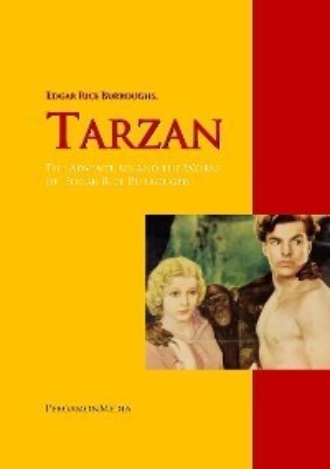
Полная версия
Tarzan: The Adventures and the Works of Edgar Rice Burroughs
But Tarzan was tiring of the situation. He was in no mood to lie there forever, especially when he contemplated the fact that the girl spy who had tried to brain him was undoubtedly escaping as rapidly as possible.
Numa was looking right into his eyes now evidently aware that he was alive. Presently the lion cocked his head on one side and whined. Tarzan knew the note, and he knew that it spelled neither rage nor hunger, and then he risked all on a single throw, encouraged by that low whine.
"Move, Numa!" he commanded and placing a palm against the tawny shoulder he pushed the lion aside. Then he rose and with a hand on his hunting knife awaited that which might follow. It was then that his eyes fell for the first time on the torn body of Sheeta. He looked from the dead cat to the live one and saw the marks of conflict upon the latter, too, and in an instant realized something of what had happened—Numa had saved him from the panther!
It seemed incredible and yet the evidence pointed clearly to the fact. He turned toward the lion and without fear approached and examined his wounds which he found superficial, and as Tarzan knelt beside him Numa rubbed an itching ear against the naked, brown shoulder. Then the ape-man stroked the great head, picked up his spear, and looked about for the trail of the girl. This he soon found leading toward the east, and as he set out upon it something prompted him to feel for the locket he had hung about his neck. It was gone!
No trace of anger was apparent upon the ape-man's face unless it was a slight tightening of the jaws; but he put his hand ruefully to the back of his head where a bump marked the place where the girl had struck him and a moment later a half-smile played across his lips. He could not help but admit that she had tricked him neatly, and that it must have taken nerve to do the thing she did and to set out armed only with a pistol through the trackless waste that lay between them and the railway and beyond into the hills where Wilhelmstal lies.
Tarzan admired courage. He was big enough to admit it and admire it even in a German spy, but he saw that in this case it only added to her resourcefulness and made her all the more dangerous and the necessity for putting her out of the way paramount. He hoped to overtake her before she reached Wilhelmstal and so he set out at the swinging trot that he could hold for hours at a stretch without apparent fatigue.
That the girl could hope to reach the town on foot in less than two days seemed improbable, for it was a good thirty miles and part of it hilly. Even as the thought crossed his mind he heard the whistle of a locomotive to the east and knew that the railway was in operation again after a shutdown of several days. If the train was going south the girl would signal it if she had reached the right of way. His keen ears caught the whining of brake shoes on wheels and a few minutes later the signal blast for brakes off. The train had stopped and started again and, as it gained headway and greater distance, Tarzan could tell from the direction of the sound that it was moving south.
The ape-man followed the trail to the railway where it ended abruptly on the west side of the track, showing that the girl had boarded the train, just as he thought. There was nothing now but to follow on to Wilhelmstal, where he hoped to find Captain Fritz Schneider, as well as the girl, and to recover his diamond-studded locket.
It was dark when Tarzan reached the little hill town of Wilhelmstal. He loitered on the outskirts, getting his bearings and trying to determine how an almost naked white man might explore the village without arousing suspicion. There were many soldiers about and the town was under guard, for he could see a lone sentinel walking his post scarce a hundred yards from him. To elude this one would not be difficult; but to enter the village and search it would be practically impossible, garbed, or un-garbed, as he was.
Creeping forward, taking advantage of every cover, lying flat and motionless when the sentry's face was toward him, the ape-man at last reached the sheltering shadows of an outhouse just inside the lines. From there he moved stealthily from building to building until at last he was discovered by a large dog in the rear of one of the bungalows. The brute came slowly toward him, growling. Tarzan stood motionless beside a tree. He could see a light in the bungalow and uniformed men moving about and he hoped that the dog would not bark. He did not; but he growled more savagely and, just at the moment that the rear door of the bungalow opened and a man stepped out, the animal charged.
He was a large dog, as large as Dango, the hyena, and he charged with all the vicious impetuosity of Numa, the lion. As he came Tarzan knelt and the dog shot through the air for his throat; but he was dealing with no man now and he found his quickness more than matched by the quickness of the Tarmangani. His teeth never reached the soft flesh—strong fingers, fingers of steel, seized his neck. He voiced a single startled yelp and clawed at the naked breast before him with his talons; but he was powerless. The mighty fingers closed upon his throat; the man rose, snapped the clawing body once, and cast it aside. At the same time a voice from the open bungalow door called: "Simba!"
There was no response. Repeating the call the man descended the steps and advanced toward the tree. In the light from the doorway Tarzan could see that he was a tall, broad-shouldered man in the uniform of a German officer. The ape-man withdrew into the shadow of the tree's stem. The man came closer, still calling the dog—he did not see the savage beast, crouching now in the shadow, awaiting him. When he had approached within ten feet of the Tarmangani, Tarzan leaped upon him—as Sabor springs to the kill, so sprang the ape-man. The momentum and weight of his body hurled the German to the ground, powerful fingers prevented an outcry and, though the officer struggled, he had no chance and a moment later lay dead beside the body of the dog.
As Tarzan stood for a moment looking down upon his kill and regretting that he could not risk voicing his beloved victory cry, the sight of the uniform suggested a means whereby he might pass to and fro through Wilhelmstal with the minimum chance of detection. Ten minutes later a tall, broad-shouldered officer stepped from the yard of the bungalow leaving behind him the corpses of a dog and a naked man.
He walked boldly along the little street and those who passed him could not guess that beneath Imperial Germany's uniform beat a savage heart that pulsed with implacable hatred for the Hun. Tarzan's first concern was to locate the hotel, for here he guessed he would find the girl, and where the girl was doubtless would be Hauptmann Fritz Schneider, who was either her confederate, her sweetheart, or both, and there, too, would be Tarzan's precious locket.
He found the hotel at last, a low, two-storied building with a veranda. There were lights on both floors and people, mostly officers, could be seen within. The ape-man considered entering and inquiring for those he sought; but his better judgment finally prompted him to reconnoiter first. Passing around the building he looked into all the lighted rooms on the first floor and, seeing neither of those for whom he had come, he swung lightly to the roof of the veranda and continued his investigations through windows of the second story.
At one corner of the hotel in a rear room the blinds were drawn; but he heard voices within and once he saw a figure silhouetted momentarily against the blind. It appeared to be the figure of a woman; but it was gone so quickly that he could not be sure. Tarzan crept close to the window and listened. Yes, there was a woman there and a man—he heard distinctly the tones of their voices although he could overhear no words, as they seemed to be whispering.
The adjoining room was dark. Tarzan tried the window and found it unlatched. All was quiet within. He raised the sash and listened again—still silence. Placing a leg over the sill he slipped within and hurriedly glanced about. The room was vacant. Crossing to the door he opened it and looked out into the hall. There was no one there, either, and he stepped out and approached the door of the adjoining room where the man and woman were.
Pressing close to the door he listened. Now he distinguished words, for the two had raised their voices as though in argument. The woman was speaking.
"I have brought the locket," she said, "as was agreed upon between you and General Kraut, as my identification. I carry no other credentials. This was to be enough. You have nothing to do but give me the papers and let me go."
The man replied in so low a tone that Tarzan could not catch the words and then the woman spoke again—a note of scorn and perhaps a little of fear in her voice.
"You would not dare, Hauptmann Schneider," she said, and then: "Do not touch me! Take your hands from me!"
It was then that Tarzan of the Apes opened the door and stepped into the room. What he saw was a huge, bull-necked German officer with one arm about the waist of Fräulein Bertha Kircher and a hand upon her forehead pushing her head back as he tried to kiss her on the mouth. The girl was struggling against the great brute; but her efforts were futile. Slowly the man's lips were coming closer to hers and slowly, step by step, she was being carried backward.
Schneider heard the noise of the opening and closing door behind him and turned. At sight of this strange officer he dropped the girl and straightened up.
"What is the meaning of this intrusion, Lieutenant?" he demanded, noting the other's epaulettes. "Leave the room at once."
Tarzan made no articulate reply; but the two there with him heard a low growl break from those firm lips—a growl that sent a shudder through the frame of the girl and brought a pallor to the red face of the Hun and his hand to his pistol but even as he drew his weapon it was wrested from him and hurled through the blind and window to the yard beyond. Then Tarzan backed against the door and slowly removed the uniform coat.
"You are Hauptmann Schneider," he said to the German.
"What of it?" growled the latter.
"I am Tarzan of the Apes," replied the ape-man. "Now you know why I intrude."
The two before him saw that he was naked beneath the coat which he threw upon the floor and then he slipped quickly from the trousers and stood there clothed only in his loin cloth. The girl had recognized him by this time, too.
"Take your hand off that pistol," Tarzan admonished her. Her hand dropped at her side. "Now come here!"
She approached and Tarzan removed the weapon and hurled it after the other. At the mention of his name Tarzan had noted the sickly pallor that overspread the features of the Hun. At last he had found the right man. At last his mate would be partially avenged—never could she be entirely avenged. Life was too short and there were too many Germans.
"What do you want of me?" demanded Schneider.
"You are going to pay the price for the thing you did at the little bungalow in the Waziri country," replied the ape-man.
Schneider commenced to bluster and threaten. Tarzan turned the key in the lock of the door and hurled the former through the window after the pistols. Then he turned to the girl. "Keep out of the way," he said in a low voice. "Tarzan of the Apes is going to kill."
The Hun ceased blustering and began to plead. "I have a wife and children at home," he cried. "I have done nothing, I—"
"You are going to die as befits your kind," said Tarzan, "with blood on your hands and a lie on your lips." He started across the room toward the burly Hauptmann. Schneider was a large and powerful man—about the height of the ape-man but much heavier. He saw that neither threats nor pleas would avail him and so he prepared to fight as a cornered rat fights for its life with all the maniacal rage, cunning, and ferocity that the first law of nature imparts to many beasts.
Lowering his bull head he charged for the ape-man and in the center of the floor the two clinched. There they stood locked and swaying for a moment until Tarzan succeeded in forcing his antagonist backward over a table which crashed to the floor, splintered by the weight of the two heavy bodies.
The girl stood watching the battle with wide eyes. She saw the two men rolling hither and thither across the floor and she heard with horror the low growls that came from the lips of the naked giant. Schneider was trying to reach his foe's throat with his fingers while, horror of horrors, Bertha Kircher could see that the other was searching for the German's jugular with his teeth!
Schneider seemed to realize this too, for he redoubled his efforts to escape and finally succeeded in rolling over on top of the ape-man and breaking away. Leaping to his feet he ran for the window; but the ape-man was too quick for him and before he could leap through the sash a heavy hand fell upon his shoulder and he was jerked back and hurled across the room to the opposite wall. There Tarzan followed him, and once again they locked, dealing each other terrific blows, until Schneider in a piercing voice screamed, "Kamerad! Kamerad!"
Tarzan grasped the man by the throat and drew his hunting knife. Schneider's back was against the wall so that though his knees wobbled he was held erect by the ape-man. Tarzan brought the sharp point to the lower part of the German's abdomen.
"Thus you slew my mate," he hissed in a terrible voice. "Thus shall you die!"
The girl staggered forward. "Oh, God, no!" she cried. "Not that. You are too brave—you cannot be such a beast as that!"
Tarzan turned at her. "No," he said, "you are right, I cannot do it—I am no German," and he raised the point of his blade and sunk it deep into the putrid heart of Hauptmann Fritz Schneider, putting a bloody period to the Hun's last gasping cry: "I did not do it! She is not—"
Then Tarzan turned toward the girl and held out his hand. "Give me my locket," he said.
She pointed toward the dead officer. "He has it." Tarzan searched him and found the trinket. "Now you may give me the papers," he said to the girl, and without a word she handed him a folded document.
For a long time he stood looking at her before ho spoke again.
"I came for you, too," he said. "It would be difficult to take you back from here and so I was going to kill you, as I have sworn to kill all your kind; but you were right when you said that I was not such a beast as that slayer of women. I could not slay him as he slew mine, nor can I slay you, who are a woman."
He crossed to the window, raised the sash and an instant later he had stepped out and disappeared into the night. And then Fräulein Bertha Kircher stepped quickly to the corpse upon the floor, slipped her hand inside the blouse and drew forth a little sheaf of papers which she tucked into her waist before she went to the window and called for help.
Chapter VII
When Blood Told
Tarzan of the Apes was disgusted. He had had the German spy, Bertha Kircher, in his power and had left her unscathed. It is true that he had slain Hauptmann Fritz Schneider, that Underlieutenant von Goss had died at his hands, and that he had otherwise wreaked vengeance upon the men of the German company who had murdered, pillaged, and raped at Tarzan's bungalow in the Waziri country. There was still another officer to be accounted for, but him he could not find. It was Lieutenant Obergatz he still sought, though vainly, for at last he learned that the man had been sent upon some special mission, whether in Africa or back to Europe Tarzan's informant either did not know or would not divulge.
But the fact that he had permitted sentiment to stay his hand when he might so easily have put Bertha Kircher out of the way in the hotel at Wilhelmstal that night rankled in the ape-man's bosom. He was shamed by his weakness, and when he had handed the paper she had given him to the British chief of staff, even though the information it contained permitted the British to frustrate a German flank attack, he was still much dissatisfied with himself. And possibly the root of this dissatisfaction lay in the fact that he realized that were he again to have the same opportunity he would still find it as impossible to slay a woman as it had been in Wilhelmstal that night.
Tarzan blamed this weakness, as he considered it, upon his association with the effeminizing influences of civilization, for in the bottom of his savage heart he held in contempt both civilization and its representatives—the men and women of the civilized countries of the world. Always was he comparing their weaknesses, their vices, their hypocrisies, and their little vanities with the open, primitive ways of his ferocious jungle mates, and all the while there battled in that same big heart with these forces another mighty force—Tarzan's love and loyalty for his friends of the civilized world.
The ape-man, reared as he had been by savage beasts amid savage beasts, was slow to make friends. Acquaintances he numbered by the hundreds; but of friends he had few. These few he would have died for as, doubtless, they would have died for him; but there were none of these fighting with the British forces in East Africa, and so, sickened and disgusted by the sight of man waging his cruel and inhuman warfare, Tarzan determined to heed the insistent call of the remote jungle of his youth, for the Germans were now on the run and the war in East Africa was so nearly over that he realized that his further services would be of negligible value.
Never regularly sworn into the service of the King, he was under no obligation to remain now that the moral obligation had been removed, and so it was that he disappeared from the British camp as mysteriously as he had appeared a few months before.
More than once had Tarzan reverted to the primitive only to return again to civilization through love for his mate; but now that she was gone he felt that this time he had definitely departed forever from the haunts of man, and that he should live and die a beast among beasts even as he had been from infancy to maturity.
Between him and his destination lay a trackless wilderness of untouched primeval savagery where, doubtless in many spots, his would be the first human foot to touch the virgin turf. Nor did this prospect dismay the Tarmangani—rather was it an urge and an inducement, for rich in his veins flowed that noble strain of blood that has made most of the earth's surface habitable for man.
The question of food and water that would have risen paramount in the mind of an ordinary man contemplating such an excursion gave Tarzan little concern. The wilderness was his natural habitat and woodcraft as inherent to him as breathing. Like other jungle animals he could scent water from a great distance and, where you or I might die of thirst, the ape-man would unerringly select the exact spot at which to dig and find water.
For several days Tarzan traversed a country rich in game and watercourses. He moved slowly, hunting and fishing, or again fraternizing or quarreling with the other savage denizens of the jungle. Now it was little Manu, the monkey, who chattered and scolded at the mighty Tarmangani and in the next breath warned him that Histah, the snake, lay coiled in the long grass just ahead. Of Manu Tarzan inquired concerning the great apes—the Mangani—and was told that few inhabited this part of the jungle, and that even these were hunting farther to the north this season of the year.
"But there is Bolgani," said Manu. "Would you like to see Bolgani?"
Manu's tone was sneering, and Tarzan knew that it was because little Manu thought all creatures feared mighty Bolgani, the gorilla. Tarzan arched his great chest and struck it with a clinched fist. "I am Tarzan," he cried. "While Tarzan was yet a balu he slew a Bolgani. Tarzan seeks the Mangani, who are his brothers, but Bolgani he does not seek, so let Bolgani keep from the path of Tarzan."
Little Manu, the monkey, was much impressed, for the way of the jungle is to boast and to believe. It was then that he condescended to tell Tarzan more of the Mangani.
"They go there and there and there," he said, making a wide sweep with a brown hand first toward the north, then west, and then south again. "For there," and he pointed due west, "is much hunting; but between lies a great place where there is no food and no water, so they must go that way," and again he swung his hand through the half-circle that explained to Tarzan the great detour the apes made to come to their hunting ground to the west.
That was all right for the Mangani, who are lazy and do not care to move rapidly; but for Tarzan the straight road would be the best. He would cross the dry country and come to the good hunting in a third of the time that it would take to go far to the north and circle back again. And so it was that he continued on toward the west, and crossing a range of low mountains came in sight of a broad plateau, rock strewn and desolate. Far in the distance he saw another range of mountains beyond which he felt must lie the hunting ground of the Mangani. There he would join them and remain for a while before continuing on toward the coast and the little cabin that his father had built beside the land-locked harbor at the jungle's edge.
Tarzan was full of plans. He would rebuild and enlarge the cabin of his birth, constructing storage houses where he would make the apes lay away food when it was plenty against the times that were lean—a thing no ape ever had dreamed of doing. And the tribe would remain always in the locality and he would be king again as he had in the past. He would try to teach them some of the better things that he had learned from man, yet knowing the ape-mind as only Tarzan could, he feared that his labors would be for naught.
The ape-man found the country he was crossing rough in the extreme, the roughest he ever had encountered. The plateau was cut by frequent canyons the passage of which often entailed hours of wearing effort. The vegetation was sparse and of a faded brown color that lent to the whole landscape a most depressing aspect. Great rocks were strewn in every direction as far as the eye could see, lying partially embedded in an impalpable dust that rose in clouds about him at every step. The sun beat down mercilessly out of a cloudless sky.
For a day Tarzan toiled across this now hateful land and at the going down of the sun the distant mountains to the west seemed no nearer than at morn. Never a sign of living thing had the ape-man seen, other than Ska, that bird of ill omen, that had followed him tirelessly since he had entered this parched waste.
No littlest beetle that he might eat had given evidence that life of any sort existed here, and it was a hungry and thirsty Tarzan who lay down to rest in the evening. He decided now to push on during the cool of the night, for he realized that even mighty Tarzan had his limitations and that where there was no food one could not eat and where there was no water the greatest woodcraft in the world could find none. It was a totally new experience to Tarzan to find so barren and terrible a country in his beloved Africa. Even the Sahara had its oases; but this frightful world gave no indication of containing a square foot of hospitable ground.
However, he had no misgivings but that he would fare forth into the wonder country of which little Manu had told him, though it was certain that he would do it with a dry skin and an empty belly. And so he fought on until daylight, when he again felt the need of rest. He was at the edge of another of those terrible canyons, the eighth he had crossed, whose precipitous sides would have taxed to the uttermost the strength of an untired man well fortified by food and water, and for the first time, as he looked down into the abyss and then at the opposite side that he must scale, misgivings began to assail his mind.
He did not fear death—with the memory of his murdered mate still fresh in his mind he almost courted it, yet strong within him was that primal instinct of self-preservation—the battling force of life that would keep him an active contender against the Great Reaper until, fighting to the very last, he should be overcome by a superior power.
A shadow swung slowly across the ground beside him, and looking up, the ape-man saw Ska, the vulture, wheeling a wide circle above him. The grim and persistent harbinger of evil aroused the man to renewed determination. He arose and approached the edge of the canyon, and then, wheeling, with his face turned upward toward the circling bird of prey, he bellowed forth the challenge of the bull ape.






